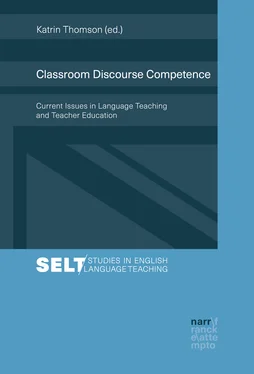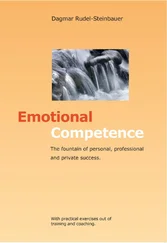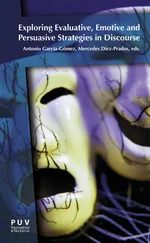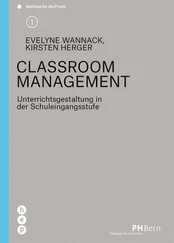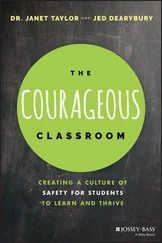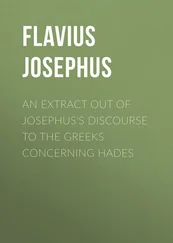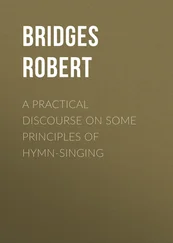The opening section ( Part I– Introduction: Classroom Discourse and Classroom Discourse Competence)lays the theoretical and conceptual foundation of this book.
Following this introductory chapter, which presents the rationale and scope of this volume, the editor then addresses the issue of CDC development in language teacher education. Katrin Thomsonargues that apart from general foreign language competence, (prospective) language teachers also need to acquire CDC since target language proficiency as such does not enable language teachers to professionally perform the complex discoursal tasks required of them in the FL classroom. Thomson first proposes a revised and expanded model of FL teachers’ professional competence and then, against this backdrop, ‘zooms into’ this model to present her conceptualization and definition of CDC.
In the second section ( Part II – Exploring the Facets of L2 Classroom Discourse Competence), the focus is on selected classroom discourse phenomena and specific sub-dimensions of CDC which (prospective) EFL teachers are eventually required to master.
The chapter by Anna Rosenillustrates the vital importance of high-quality teacher talk for students’ development of conversational skills in the target language. Drawing on research findings which suggest that conversational features (such as discourse markers, question tags or stance markers) are underused in teacher talk, Rosen shows in her transcript analyses that when they do occur they are likely to lead to learner uptake in classroom discourse. Based on her findings the author points out some of the implications for English language teaching and teacher education. Among other recommendations, Rosen suggests that pre-service teacher education programs need to provide possibilities for awareness-raising and the acquisition of knowledge about conversational features and discourse strategies.
Ralf Gießlerfocuses on lexical classroom discourse (LCD), i.e. a specific type of classroom discourse that aims to support students’ lexical learning. As regards the language learners’ perspective, developing lexical competence, the author argues, implies more than learning about word meanings. Foreign language learners also need to gain a deep understanding of a word’s form and use, its pronunciation, collocations etc. From a teacher’s perspective, mastering the complex and challenging tasks of ‘robust vocabulary instruction’, thus, requires a high command of LCD skills. In the context of university-level teacher education, these skills – the author suggests – can be developed if prospective teachers are given opportunities to explore and discuss the dimensions of vocabulary teaching/learning in L2 classroom discourse. As Gießler’s chapter and case studies in particular show, this can be achieved by using video-recorded lesson sequences in combination with individual written analyses (IWAs) of these vignettes. Video-based classroom data allows student teachers to investigate and reflect upon the teachers’ classroom discourse moves that may support (or hinder) lexical learning in specific classroom situations. Considering the importance of lexical learning in foreign language education, this chapter underlines the necessity to sensitize and prepare prospective teachers for the challenging tasks they will encounter in L2 lexical classroom discourse.
In their chapter, Jochen Baierand Emily Brehmaddress the challenges that EFL teacher face in L2 literary classroom discourse. Structuring, orchestrating and shaping whole-class discussions about literary texts requires professional discourse competences which prospective teachers, the authors argue, need to develop systematically. Baier and Brehm emphasize that even with a native speaker-like command of English, scaffolding literary classroom discourse is quite difficult as it goes far beyond the notion of merely initiating follow-up communication with learners after having read a text. Apart from linguistic aspects, these challenges arise, they explain, from the theoretical frictions between opposing literary theories (such as New Criticism and Response Theory), which ultimately also inform different methodological approaches to teaching (with) literature in foreign language classrooms. Teachers, for instance, need to find ways to integrate and ‘reconcile’ cognitive-analytical and individual response-oriented approaches in literary classroom discourse. Further issues, such as the heterogeneity within learner groups or students’ altered reading habits in the era of digitalization, present further challenges that teachers are required to respond to in literary discourse. The use of scaffolding techniques such as prompting can be effective means to enhance student learning. Baier and Brehm categorize different types of prompts and discuss their functions and potentially beneficial effects on student-activation in L2 literary discourse. Using Kate Chopin’s “The Story of an Hour” as an example, the authors illustrate how prompts can be used to get language learners engaged in classroom discourse. Prospective EFL teachers, they conclude, would profit from training programs in which the development of L2 literary discourse competence, including the effective use of scaffolding strategies like prompting, would play a more prominent role.
Turning to another subtype of CDC, Katrin Thomsonfocuses on teachers’ discourse competence in L2 classroom management contexts. In light of the conceptual changes that the notion of ‘classroom management’ (CM) has undergone since the 1960s, Thomson pleads for a stronger consideration of CM issues in the subject-specific domain of EFL teacher education. Her conceptualization of L2 CM competence challenges previous views that assume that ‘classroom management’ is exclusively linked to teachers’ general pedagogical knowledge. The author pinpoints the distinctive characteristics of CM discourse in ELT and shows that, in spite of the concept’s transdisciplinary nature, a subject-specific approach to developing L2 CM competences is required as well if prospective EFL teachers are supposed to master the multitude of discourse tasks which they will encounter in managerial contexts.
Charlott Falkenhagenand Sieglinde Spathfocus on teacher discourse competences in CLIL settings. Based on the notion that CLIL contexts require specific professional discourse competences, the authors use authentic classroom data from CLIL music/English lessons in order to examine the functions and effects of certain discourse features (such as the amount of teacher talking time, teacher code-switching and the implementation of IRF patterns) in this pedagogical context. In view of the particular challenges that L2 learners encounter in CLIL classrooms, Falkenhagen and Spath stress the importance of teachers’ CLIL discourse competence and argue that EFL/CLIL teachers require professional training to successfully combine language and content learning.
Shifting the focus to a different subtype of classroom discourse competence, Katalin Schober’s chapter draws attention to the challenges that L2 classroom discourse in inclusive settings presents to foreign language teacher and learners alike. Focusing on hearing-impaired language learners in particular, Schober explains why EFL teachers need to acquire not only expert knowledge on inclusive classroom discourse, but also the skills and competences which enable teachers to use inclusive discourse strategies in order to meet and effectively respond to the special needs of hearing-impaired learners. For instance, language teachers in inclusive settings need to develop a nuanced understanding of certain discourse phenomema (such as code-switching and echoing) which have been subject to much critical discussion in other language teaching contexts. Emphasizing the importance of EFL teachers’ reflective-interactional competence and discoursal flexibility in inclusive classroom settings, the author pleads for a stronger and more adequate consideration of inclusive classroom discourse issues in pre-service teacher education programs at university level.
Читать дальше
